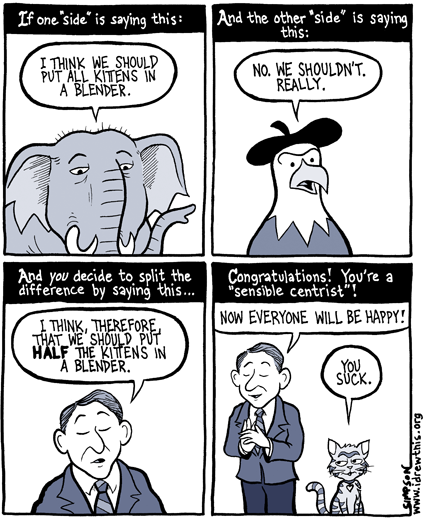
I never get tired of this cartoon. It reminds me what being a Sensible Moderateâ„¢ is not at all about.
The latest proposal for the foreshore and seabed is PC gone mad — put it in the public domain, but not really the public domain per se, and everyone’s happy. Or not unhappy. Hopefully. And if they are, they’re just being unreasonable.
It’s blending half the kittens in order to avoid tackling the complex and painful political and historical problem which the issue represents. It’s the cop-out option which aims to offend nobody, but really only achieves that goal on the surface. It’s like a butchered mihi delivered by someone who’s not really well-meaning but wants to appear so, ignorant of the fact that wairua matters.
This has Peter Dunne’s fingerprints all over it, and he’s the one tying himself in verbal and conceptual knots: “no one owns it but we all own it and so therefore we all have an interest in it”. The unnamed sources are no better, arguing that since there are no rights, “everyone’s rights are protected.” You couldn’t make this up.
The trouble is that MÄori — and the mÄori party in particular — don’t just want everyone to get along; they want their historical claims to the takutai moana tested and upheld, or negotiated to mutual satisfaction. This will necessarily include some positive determination as to the ownership status of those stretches of land and sea, from which will derive other rights — to development, to exercise kaitiakitanga, and so on — which can and should be negotiated on the merits of the original determination. This proposal commits a similar legal fallacy to the Foreshore and Seabed Act, in reversing the legal test as to customary title. Prior to the FSA all land was presumed to be in customary ownership unless alienation could be proven — the FSA reversed this, forcing claimants to prove that their rights to the foreshore and seabed had not been alienated. To be satisfactory to MÄori, any resolution must address this change, and either provide recourse to that pre-existing legal framework, or a negotiated framework which satisfies all parties. MÄori don’t want a Clayton’s solution in which they gain nothing except by losing slightly less than the Foreshore and Seabed Act took away, while things literally do not change for PÄkehÄ.
Let me be clear, though: I don’t so much mind the function of the proposal as its justification. I prefer Hone Harawira’s proposal — full customary title, inalienable, with guaranteed access for all New Zealanders in perpetuity — but recognise that this is probably too ambitious in reality. A solution which mimics public domain in function while resolving the question of customary title could work. But this isn’t such a proposal. There is no short-cut, no easy way out of this. It’s time for both major parties to stop avoiding this fact, and face up to the responsibilities — and the opportunities — these historical times present.
Update: Yikes, even Marty G sort-of agrees with me!
L

